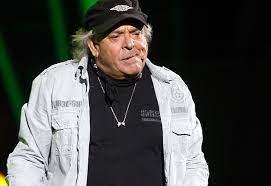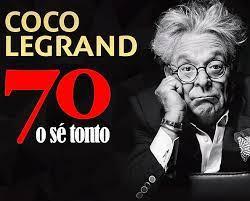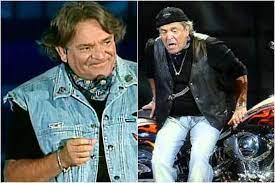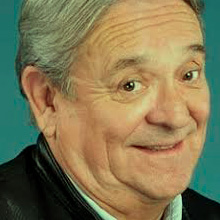El chiste que más disfruto es el que ataca al núcleo familiar
En Chile es reconocido como uno de los grandes humorista que ha dado este país. Me refiero a Alejandro Javier González Legrand, “Coco Legrand” (1947). Monologuista por excelencia, donde aborda los problemas familiares, sexuales, laborales y políticos que afectan a la sociedad, así como otros de la contingencia. Pero también sus chistes cortos, "cuentos" como él los llama, y sus inigualables interpretaciones humorísticas de personajes "tipo" o típicos de cualquier estrato social chileno, lo llevaron al éxito.
Comenzó su carrera en el humor en 1980. Sus presentaciones en el ya desaparecido teatro de revistas Bim Bam Bum en Santiago, resultaron memorables, así como sus actuaciones en televisión y radio. La consagración definitiva de Coco Legrand llegó con su recordada presentación en el XIII Festival Internacional de la Canción de Viña del Mar.
Entre 1980 y 1981 trabajó en Argentina, donde rodó tres películas cómicas, dos de ellas junto a Alberto Olmedo y Jorge Porcel. Coco Legrand fue gerente y propietario de Circus Ok, un teatro y empresa de espectáculos.
Ha obtenido en su carreara la Gaviota de Oro y Gaviota de Plata, Festival de Viña del Mar (2000); la Antorcha de Plata, Antorcha de Oro y Gaviota de Plata, Festival de Viña del Mar (2006); la Antorcha de Plata, doble Antorcha de Oro y Gaviota de Plata, Festival de Viña del Mar (2010) y el Premio Nacional de Humor de Chile (2016), entre otras distinciones.
Por todo lo anterior, porque me cae muy bien y porque lo he podido conocer un poco, es un orgullo para mí que haya aceptado este “diáloco en vivo”…
PP: ¿Te gusta que te hagan entrevistas, Coco?
COCO: Sí, si son rápidas.
PP: Bueno dependerá de la longitud de tus respuestas. Tengo fama de que mis preguntas son largas. Veremos qué hacer… Comienzo: ¿cómo ves el estado del humor en Chile, en televisión, radio, teatro, literatura y gráfica?
COCO: Está mejor ahora porque hay más libertad de expresión, ¿estamos en democracia, no? Claro, todavía existen problemas. Por ejemplo, en televisión hay que usar bozal. A los críticos los veo como eunucos. La radio mejora. Tiene más libertad. Se puede hacer más y mejor humor ahora en radio. Los humoristas gráficos también son buenos. Los medios están ávidos de humor. La literatura humorística es pobre.
PP: Bueno, es el mismo panorama de unos cuantos países que conozco. ¿Sabes? En varias naciones latinoamericanas se dice: "mi pueblo es un pueblo de humoristas", "en mi país, tú mueves una piedra y sale un humorista", etc.. ¿En Chile se dice lo mismo?
COCO: En todos los países latinoamericanos, al igual que en Chile, tenemos la herencia de los españoles, su salero, su chispa, por tanto somos buenos para el chiste, la talla rápida, más o menos ingeniosa, basada en la burla a las vivencias cotidianas, pero obviamente, con poco nivel, poca cultura.
PP: Toda la razón. Se confunde buen humor con humor vulgar, chabacano o ácido, agresivo. Eso nos sucede a casi todos los latinoamericanos (para no ser absolutista). Pero seguimos “teorizando”: ¿Es verdad la usadísima frase: "es más fácil hacer llorar que hacer reír?
COCO: Sí, porque en la vida hay menos situaciones graciosas que dramáticas.
PP: Como siempre digo, desde que nacemos enseguida lloramos. Abundan más desgracias que momentos felices, la tragedia, el drama, y las emociones negativas como la tristeza y el enojo se dan silvestres. El humor no. No depende de la emocionalidad, si o de la inteligencia. Pero hablemos de ti mejor. Por ejemplo, ¿cuándo decidiste hacerte humorista?
COCO: Desde el colegio ya lo sabía. Tuve que estudiar otra profesión para complacer a mis padres. Tuve la influencia de Firulete (Jorge Romero), del programa radial "La familia chilena" de Manolo González.
PP: Conozco el trabajo de esos dos grandes. Me encantan. Y a Firulete lo conocí en persona, a Manolo González no. Pero sigamos, para ti, ¿el humorista nace o se hace?
COCO: El humor es un líquido, un fluido que corre por las venas del ser humano y produce la capacidad de reír. Eso lo diferencia de los animales. Cuando hay mucho fluido se ve distorsionado, se siente distorsionadamente. Ese es el humorista. Si te preparas técnicamente, si adquieres oficio serás humorista profesional. Otros no lo hacen y viven como humoristas anónimos.
PP: Bueno, si lo dices simbólicamente, por supuesto que estoy de acuerdo. Pero por si acaso, expongo mi opinión por si le puede aclarar algo a nuestros lectores: lo que el humor es un líquido, lo dijeron los antiguos griegos, pero se referían al humor como estado de ánimo, no al humor como ejercicio del sentido del humor. Pero sí coindimos en que hay que superarse y desarrollarse técnica y culturalmente para alcanzar la calidad profesional necesaria. Mírate, sabemos que tu vida ha sido dura y te has superado. Por ejemplo, dile a nuestros lectores cuál fue el mejor y el peor momento de su carrera en el humor hasta el día de hoy?
COCO: El mejor momento lo vivo a diario con los proyectos y los aciertos. El peor momento fue cuando perdí a mi hijo. Ahí empecé a ver con odio, con resentimiento. Comencé a expresarme de manera más dramática y eso mismo volverlo gracioso. Imagínate, "Con la camiseta puesta", el espectáculo de esa época, se ve la verdad de la vida con sorna, con burla, con mucha exageración, no con ironía sino con sarcasmo. Realmente no me gustó esa etapa. Mi mujer me decía: "abre los ojos, haz otra cosa, tú puedes". El humor es un arma para entretener, pero también puede hacer daño, destruir.
PP: Sí, me imagino cómo viviste esa etapa. He tenido graves problemas con mis sesres queridon estando actando lejos y es terrible. Pero “el show debe continuar”… Esto me lleva a la siguiente pregunta: como profesional del humor, ¿te ríes fácil? ¿Con qué tipo de chistes?
COCO: Sí, me río fácil y mucho. Lo que no me gusta es el humor negro. El tipo de chiste que más disfruto es el que ataca al núcleo familiar. Por ejemplo: el padre de familia que es el campeón de las excusas inventadas e ingeniosas. Una madrugada llega borracho y le dice a la mujer: “no me digas nada, quedé "en pana"), se me pincharon las cuatro ruedas...” Y la esposa le responde: “¡Pero si tú no tienes ni auto!”
PP: Ja, ja… Sí, te encanta el costumbrismo, se nota. A mí también, pero a diferencia tuya me fascina el humor negro. Pero ahora cuéntame alguna anécdota relacionada con nuestra profesión.
COCO: Te contaré dos anécdotas como humorista. Una vez en el teatro "Bim Bam Bum", subí sin ensayar a un escenario que giraba sobre su eje. Cuando giro me di un golpe y caí al público, encima de una vieja y sin soltar el micrófono. La vieja comenzó a gritar y yo le dije: "Señora, ¿es primera vez que usted tiene un coco encima?".
PP: Ja, ja… me imagino a la señora y al público riendo. ¿Y la otra?
COCO: La otra fue en Suecia. Yo actuaba para los exiliados políticos. En medio de la actuación suena un celular altísimo. Yo miré al chileno y dije: "Se están agrandando. En Chile solo le sonaban las tripas".
PP: Ja, ja, Ahora me imagino esta situación. No dudo que hubo más de alguno que se molestó, porque sabemos que hay mentes sin sentido del humor y se toman todo muy a pecho, con mucha gravedad. Conozco a varios colegas que han pasado por eso también… A propósito, ¿con cuáles colegas se identifica?
COCO: Con los humoristas que más me identifico son: Woody Allen, por reflejar la idiosincrasia del neoyorquino. y los hispanoparlantes Gasalla, Pinti, Perciavale, Quino...
PP: Tienes buen gusto. Y para ir cerrando, ¿qué me aconsejas a mí como humorista?
COCO: Que te hagas ministro o político. Son los mejores humoristas. Una vez oí a uno decir, después de un terremoto violento, lo siguiente: “Este sismo nos benefició bastante. Derrumbó muchas casas viejas...”.
PP: Ja, ja… Pero no, Coco, si tengo que hacerme político para hacerme humorista, prefiero hacerme funerario.
Bueno, te agradezco en el alma por tu tiempo y buena disposición. Te deseo mucha salud y muchísimos éxitos más.



By Pepe Pelayo
The joke that I enjoy the most is the one that attacks the family unit.
In Chile he is recognized as one of the great comedians that this country has produced. I am referring to Alejandro Javier González Legrand, “Coco Legrand” (1947). Monologist par excellence, where he addresses family, sexual, work and political problems that affect society, as well as other contingency problems. But also his short jokes, "stories" as he calls them, and his unmatched humorous interpretations of "typical" or typical characters from any Chilean social stratum, led him to success.
He began his career in comedy in 1980. His performances at the now defunct Bim Bam Bum magazine theater in Santiago were memorable, as were his performances on television and radio. Coco Legrand's definitive consecration came with her memorable presentation at the XIII Viña del Mar International Song Festival.
Between 1980 and 1981 he worked in Argentina, where he filmed three comedy films, two of them with Alberto Olmedo and Jorge Porcel. Coco Legrand was the manager and owner of Circus Ok, a theater and performance company.
In his career he has obtained the Golden Seagull and Silver Seagull, Viña del Mar Festival (2000); the Silver Torch, Golden Torch and Silver Seagull, Viña del Mar Festival (2006); the Silver Torch, double Golden Torch and Silver Seagull, Viña del Mar Festival (2010) and the Chilean National Humor Award (2016), among other distinctions.
For all of the above, because I like him very much and because I have been able to get to know him a little, I am proud that he has accepted this “live dialogue”…
PP: Do you like being interviewed, Coco?
COCO: Yes, if they are fast.
PP: Well it will depend on the length of your answers. I have a reputation for having long questions. We'll see what to do... Start: how do you see the state of humor in Chile, on television, radio, theater, literature and graphics?
COCO: It's better now because there is more freedom of expression, we are in a democracy, right? Of course, there are still problems. For example, on television you have to wear a muzzle. I see critics as eunuchs. The radio improves. You have more freedom. You can do more and better humor now on the radio. Graphic comedians are also good. The media is hungry for humor. Humorous literature is poor.
PP: Well, it is the same panorama in a few countries that I know. Know? In several Latin American nations it is said: "my town is a town of comedians", "in my country, you move a stone and a comedian comes out", etc. Is the same thing said in Chile?
COCO: In all Latin American countries, as in Chile, we have the heritage of the Spanish, their salt shaker, their spark, therefore we are good at jokes, quick carving, more or less witty, based on mockery of the daily experiences, but obviously, with little level, little culture.
PP: Absolutely right. Good humor is confused with vulgar, tawdry or acidic, aggressive humor. That happens to almost all Latin Americans (not to be an absolutist). But we continue "theorizing": Is the very used phrase true: "it is easier to make people cry than to make them laugh?"
COCO: Yes, because in life there are fewer funny situations than dramaticones.
PP: As I always say, from the moment we are born we immediately cry. There are more misfortunes than happy moments, tragedy, drama, and negative emotions such as sadness and anger run wild. Not humor. It does not depend on emotionality, but on intelligence. But let's talk about you better. For example, when did you decide to become a comedian?
COCO: I already knew it since school. I had to study another profession to please my parents. I was influenced by Firulete (Jorge Romero), from the radio program "La familia chilena" by Manolo González.
PP: I know the work of those two greats. I love them. And I met Firulete in person, but not Manolo González. But let's continue, for you, is a comedian born or made?
COCO: Humor is a liquid, a fluid that runs through the veins of the human being and produces the ability to laugh. That differentiates it from animals. When there is a lot of fluid it looks distorted, it feels distorted. That's the comedian. If you prepare yourself technically, if you acquire a trade you will be a professional comedian. Others don't and live as anonymous comedians.
PP: Well, if you say it symbolically, of course I agree. But just in case, I present my opinion in case it can clarify something for our readers: the ancient Greeks said that humor is a liquid, but they were referring to humor as a state of mind, not to humor as an exercise of the sense of humor. humor. But we do agree that we must improve ourselves and develop ourselves technically and culturally to achieve the necessary professional quality. Look at you, we know that your life has been hard and you have overcome yourself. For example, tell our readers what was the best and worst moment of your comedy career to date?
COCO: I live the best moment every day with the projects and the successes. The worst moment was when I lost my son. There I began to see with hatred, with resentment. I began to express myself more dramatically and that made it funny. Imagine, "With the T-shirt on", the show of that time, the truth of life is seen with sarcasm, with mockery, with a lot of exaggeration, not with irony but with sarcasm. I really didn't like that stage. My wife told me: "open your eyes, do something else, you can do it." Humor is a weapon to entertain, but it can also hurt and destroy.
PP: Yes, I imagine how you lived that stage. I have had serious problems with my loved ones while working away and it is terrible. But “the show must go on”… This leads me to the next question: as a humor professional, do you laugh easily? With what kind of jokes?
COCO: Yes, I laugh easily and a lot. What I don't like is black humor. The type of joke that I enjoy the most is the one that attacks the family unit. For example: the father of a family who is the champion of invented and ingenious excuses. One morning he arrives drunk and tells the woman: “Don't tell me anything, I'm in a bad mood, all four tires went flat…” And the wife responds: “But you don't even have a car! ”
PP: Ha, ha… Yes, you love customs, it shows. Me too, but unlike you I am fascinated by black humor. But now tell me some anecdote related to our profession.
COCO: I will tell you two anecdotes as a comedian. Once at the "Bim Bam Bum" theater, I went up without rehearsing to a stage that rotated on its axis. When I turned I took a hit and fell into the audience, on top of an old woman and without letting go of the microphone. The old woman began to scream and I said to her: "Madam, is this the first time that you have had a coconut on you?"
PP: Ha ha… I imagine the lady and the audience laughing. And the other?
COCO: The other was in Sweden. I acted for political exiles. In the middle of the performance a loud cell phone rings. I looked at the Chilean and said: "They're getting bigger. In Chile they only had their guts rumbling."
PP: Ha ha, now I imagine this situation. I don't doubt that there were more than a few who were upset, because we know that there are minds without a sense of humor and they take everything very personally, very seriously. I know several colleagues who have gone through that too… By the way, which colleagues do you identify with?
COCO: The comedians I most identify with are: Woody Allen, for reflecting the idiosyncrasy of the New Yorker. and the Spanish speakers Gasalla, Pinti, Perciavale, Quino...
PP: You have good taste. And to close, what do you advise me as a comedian?
COCO: That you become a minister or a politician. They are the best comedians. I once heard someone say, after a violent earthquake, the following: “This earthquake benefited us a lot. “It demolished many old houses…”
PP: Ha, ha... But no, Coco, if I have to become a politician to become a comedian, I prefer to become a mortician.
Well, I thank you from the bottom of my soul for your time and good disposition. I wish you good health and many more successes.
(Este texto ha sido traducido al español por Google Translate)

